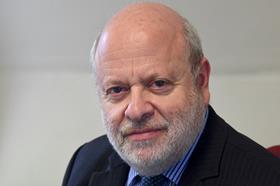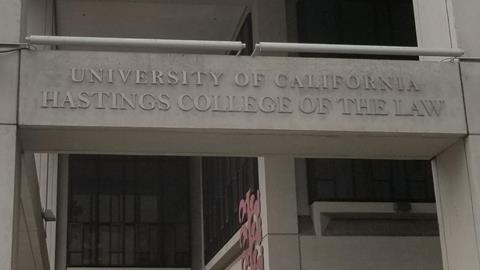We are used to heated debates over whether institutions named after historical figures should change their names because of actions from their past now considered unacceptable. So a hall of residence at Liverpool University lost its Gladstone name earlier this year because of the Victorian prime minister’s opposition to the abolition of slavery - his family used slaves on their West Indian plantation.

This particular part of the culture wars has now come to the law, in an interesting case to test our views. At the University of California, the law school is called the Hastings College of Law (UC Hastings). Hastings himself was Serranus Hastings. He was an Iowan lawyer, who was elected to the US House of Representatives and became Chief Justice of the Iowan Supreme Court. After a year, he moved to California, where he became Chief Justice of the Californian Supreme Court. When his term ended, he won election as attorney general of California. He began practising law again, made a good living, and gave $100,000 to found a law school at the University of California, which was not surprisingly named after him. What could be wrong with that, a law school named after a prominent lawyer, politician and judge?
It was only over 120 years after his death that another side appeared, in an article in the San Francisco Chronicle. The article rehearsed the actions of two prominent Californians, Hastings and Leland Stanford (a governor and senator of California, after whom Stanford University is named) in promoting and financing 'Indian-hunting' expeditions during the Gold Rush. This had the benefit of ridding the state of those who might assert land rights. The native population plummeted during this period from 150,000 to 18,000. It is estimated that expeditions carried out at Hastings’s behest killed at least 283 men, women and children. As the article asked: if we remove the names from institutions of those who enslaved or discriminated against a whole people, how do we treat the names of those whose aim was extermination?
UC Hastings has agonised over this question since 2017. It first responded by becoming involved in restorative justice initiatives with the Indian tribe concerned, the Round Valley Indian Tribes Tribal Council and their Yuki Committee. Its actions include: a permanent and public memorial to the Yuki people in a prominent location in the lobby of the main administrative building, with display panels, historical explanations and cultural presentations; founding an Indigenous Law Center and related educational programmes; student pro bono assistance to the residents of Round Valley; and discussing educational opportunities for students of the Yuki People and other members of the Round Valley Indian Tribes.
But should the name change? Arguments were put on both sides. It is not necessary to go over the arguments in favour of a name change, but against people asked what the change would achieve, and whether it might lead to a decline in applications and perhaps a loss of philanthropic and alumni support.
Well, the decision has now been made. Just a few days ago, UC Hastings decided to ask state legislators to change the law school’s name (it requires a change in the law).
I think that is the right decision. Once one has got over the shock that a lawyer and judge has promoted and financed the killing of hundreds of people, and the further shock that this has not been well-known for over a century, the obvious conclusion is that his name should no longer grace – of all things – a law school.
I cannot resist ending this tale by speaking of something closer to home. This does not involve murder or enslavement or anything approaching the terrible quality of the story just told. So forgive me for the radical change of gear. But I wondered whether history could ever come back to shame the Law Society, and thought of a wrong perpetrated on a much smaller scale, which has never been remedied.
In Bebb v The Law Society [1914] 1 Ch. 286, the facts were that the Law Society returned application fees to four women, informing them that if they turned up for the preliminary exam before becoming articled clerks, they would not be admitted because they were women. The women tested the refusal in the courts, and the courts backed the Law Society decision, on the grounds that a woman could not be a ‘person’ within the Solicitors Act 1843.
At the very least, the descendants of those women should be found, and a formal ceremony held at the Law Society at which an apology is made. It would be good if a room at the Law Society could be named after one or more of them: Gwyneth Bebb, Karin Costelloe, Maud Ingram, and Frances Nettlefold.
Jonathan Goldsmith is Law Society Council member for EU matters and a former secretary general of the Council of Bars and Law Societies of Europe. All views expressed are personal and are not made in his capacity as a Law Society Council member, nor on behalf of the Law Society
































14 Readers' comments